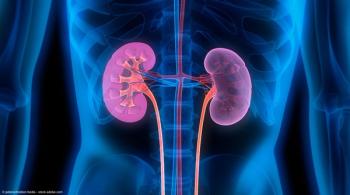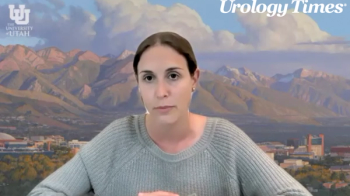
Dr. Lange and Dr. Matin on lymph node dissection at the time of nephroureterectomy
“We highlighted that there is building evidence suggesting clinical benefits for lymph node dissection, such as a clear benefit of staging, which allows us to perform better prognostication for patients,” says Suzanne Lange, MD.
In this video, Suzanne Lange, MD, and Surena F. Matin, MD, discuss the background and notable findings from the European Urology Focus study, “Optimizing Lymph Node Dissection at the Time of Nephroureterectomy for High-risk Upper Tract Urothelial Carcinoma.” Lange is a urologic oncology fellow at the University of Texas MD Anderson Cancer Center in Houston and Matin is a professor of urology at the University of Texas MD Anderson Cancer Center.
Transcript:
Please discuss the background behind this paper.
Lange: The purpose of this paper was to create a top-line review of lymph node dissection use at the time of radical nephroureterectomy for patients with upper tract urothelial carcinoma. Within the paper, we wanted to briefly discuss the evidence supporting clinical benefits of lymph node dissection, highlight the poor utilization and potential barriers to use, and then discuss some of the considerations on how and why we should improve these.
What were some of the notable findings? Were any of them surprising to you and your coauthors?
Lange: There were several notable findings. For me, as a more junior urologist, I think some of them were surprising, but Dr. Matin has been working for a long time to build this evidence. We highlighted that there is building evidence suggesting clinical benefits for lymph node dissection, such as a clear benefit of staging, which allows us to perform better prognostication for patients. And then we discussed that there are data that suggest a therapeutic benefit to this as well. The data supporting the therapeutic benefit, have been in patients with renal pelvis and proximal ureteral disease, and not as clearly demonstrated in those with distal ureteral tumors. Of note, although we say that the data do suggest a therapeutic benefit, we can't deny that there are some data that show equivocal findings.
Matin: What Dr. Lange is highlighting are some of the pitfalls that we have in the data. One has to look at these studies very critically, because one of the things we're finding is that there appear to be specific areas that lymph node metastases migrate to, depending on where the index tumor is located. And so although the data are pretty good for the renal pelvis and proximal ureter, they're not as clear with the distal ureteral tumors. Part of that may be related to the fact that people just aren't removing the correct lymph nodes in that setting. Typically, for the mid and distal ureter, we focus on the pelvis. But our institution, in collaboration with Memorial Sloan Kettering and Moffitt Cancer Center, have shown that there's cranial migration of lymph node metastases in these cases. So if we're not actually doing a high enough dissection, then obviously we don't have an opportunity to show a benefit in that setting. The other area that I would bring attention to in terms of critically looking at papers in this area, are things like from the national databases that we have, like for example, [Surveillance, Epidemiology, and End Results] or [the National Cancer Database]. The issue there is that we don't know which lymph nodes were removed, and so many studies that try to address this and are not able to identify that adequate templates were removed then essentially, they are really removing the ability for us to confidently assess the therapeutic benefit.
This transcript was edited for clarity.
Newsletter
Stay current with the latest urology news and practice-changing insights — sign up now for the essential updates every urologist needs.






